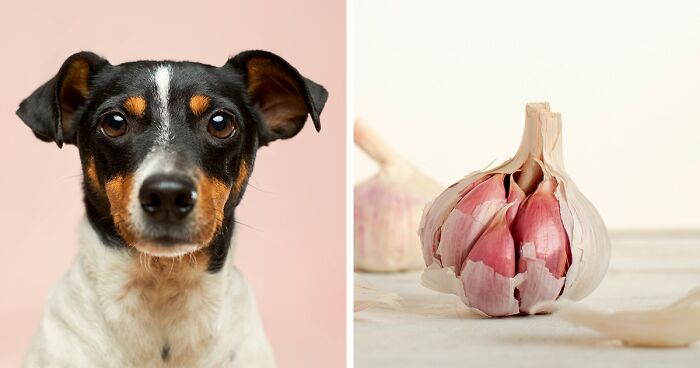Garlic, a staple in human diets, raises a critical query in pet care: is it safe for dogs? The answer is no. Garlic, part of the Allium family, contains compounds toxic to dogs. So, it potentially leads to gastrointestinal distress and hemolytic anemia.
This article is all about garlic and how it affects dogs. It’s going to cover everything you need to know, like whether dogs can eat garlic, the signs that garlic is harming them, and why garlic is sometimes found in dog food.
- Garlic contains thiosulfates toxic to dogs, causing health risks.
- Symptoms of garlic poisoning in dogs include lethargy and vomiting.
- Garlic powder and salt are more concentrated, hence more toxic to dogs.
The information provided herein is for informational purposes only. Please refer to our disclaimer for more details..
- Is It Safe for Dogs to Eat Garlic?
- Why Is Garlic Bad for Dogs?
- Signs of Garlic Poisoning in Dogs
- How Much Garlic Is Toxic to Dogs?
- Can I Feed My Dog Garlic Bread?
- Can Dogs Have Garlic Powder or Garlic Salt?
- Can I Feed My Dog Garlic Supplements?
- Can Garlic Help with Flea Control?
- Why Do Some Dog Foods Have Garlic?
- What Should You Do If Your Dog Eats Garlic?
- Alternatives to Garlic for Dogs
- Conclusion
Is It Safe for Dogs to Eat Garlic?
When it comes to feeding garlic to dogs, safety is a major concern. The consensus among experts is that garlic is not safe for canine consumption. The primary reason for this is the presence of thiosulfates in garlic, which are harmful to dogs. These compounds can cause significant health issues, even in small amounts. You should not give even cooked and raw garlic.
The toxicity of garlic in dogs is not just a matter of the quantity consumed; it also depends on the individual dog’s size and overall health condition.
Why Is Garlic Bad for Dogs?
Garlic’s detrimental effects on dogs primarily stem from its capacity to cause oxidative damage to red blood cells. This oxidative damage is primarily due to thiosulfate. When dogs ingest garlic, these thiosulfates can cause the red blood cells to burst, known as hemolytic anemia. This process reduces the red blood cells’ ability to carry oxygen throughout the dog’s body. It can lead to various health issues, including lethargy, weakness, and in severe cases, organ damage.
Besides the risk of hemolytic anemia, garlic can also induce digestive problems in dogs. The compounds in garlic can irritate the dog’s gastrointestinal tract. It causes symptoms such as vomiting, diarrhea, and loss of appetite. These digestive issues can be distressing for the dog and may require veterinary attention to resolve.
The combination of these risks – the potential for hemolytic anemia and digestive distress – underscores why garlic is considered unsafe for dogs.
Signs of Garlic Poisoning in Dogs
If your dog ingests garlic, certain symptoms can indicate poisoning. These symptoms can vary in severity depending on the amount of garlic consumed and the dog’s sensitivity. Key signs of garlic poisoning in dogs include:
- Lethargy: Dogs may appear unusually tired or unresponsive.
- Vomiting and Diarrhea: Gastrointestinal upset is a common symptom, manifesting as vomiting or diarrhea.
- PaleGums: The destruction of red blood cells can lead to anemia, which often causes the gums to appear paler than normal.
- Increased Heart Rate: A rapid heartbeat can occur as the body tries to compensate for the reduced oxygen-carrying capacity of the blood.
- Abdominal Pain: Dogs might show signs of discomfort or pain in the abdominal area.
It’s important to note that these symptoms may not appear immediately after ingestion of garlic. In some cases, it can take several days for signs of garlic poisoning to become apparent.
How Much Garlic Is Toxic to Dogs?
When assessing the toxicity of garlic for dogs, we need to consider a few factors. Research suggests that 15 to 30 grams of garlic per kilogram of a dog’s body weight can lead to toxic effects. Additionally, as little as 2 grams per pound of a dog’s weight can cause noticeable stomach changes. And large amounts can damage the blood.
A typical garlic clove has a weight of around 5 grams. Imagine a medium-sized dog, say about 25 pounds. This dog could need medical help if it eats around 50 grams of garlic. That’s equal to about 10 cloves, or half of a garlic bulb. Such a small amount of garlic can be harmful and may lead to serious health problems like anemia.
So, it’s usually best to not give garlic to dogs. And, if your dog does eat a lot of garlic, you should definitely get help from a vet.
Can I Feed My Dog Garlic Bread?
Giving garlic bread to dogs isn’t a good idea. This is because of the garlic in it and other stuff like butter and spices. As we discussed before, garlic has things in it that are bad for dogs. Even small amounts in garlic bread can be harmful.
Also, the seasoning in garlic bread can mess up a dog’s stomach. This can lead to problems like vomiting or diarrhea. So, it’s best not to give garlic bread to dogs, to avoid any health issues.
Can Dogs Have Garlic Powder or Garlic Salt?
Garlic powder and garlic salt are more concentrated forms of garlic. And thus are more toxic to dogs than fresh garlic. The higher concentration means that even small doses can lead to significant garlic poisoning in dogs.
Due to this increased potency, it is strongly advised to avoid giving your dog any food containing garlic powder or garlic salt. This precaution helps prevent the potential for garlic toxicity, ensuring your dog’s safety and well-being.
Can I Feed My Dog Garlic Supplements?
Despite garlic’s known toxicity, some people and sources say it’s okay to give dogs garlic supplements. They use garlic for things like natural wellness or to keep fleas and ticks away. But, it’s important to remember that not all studies say garlic is good for pets.
The big problem is how much garlic to give. A tiny bit might be safe for most dogs, but there’s no strong proof that it’s really beneficial. And, we know garlic can be risky. If you’re thinking about garlic supplements for your dog, you should talk to a vet first. Giving the wrong amount can be toxic.
Working with a vet helps you make the best health plan for your dog, based on what they need and their health. This careful way helps keep your dog safe and healthy.
Can Garlic Help with Flea Control?
Some people think garlic may keep fleas away from dogs, but there’s no real science to back this up. Sure, there are stories about garlic working for flea control, but no solid proof. Since garlic can be harmful to dogs, it’s better to use safe and proven methods for flea control.
Things like prescribed medications and flea collars are known to work. If you need safe ways to control fleas, it’s always a good idea to talk to a vet. They can guide you to the best options.
Why Do Some Dog Foods Have Garlic?
You might wonder why some dog foods have garlic, even though it can be risky for dogs. The reason is, that these dog foods use very little garlic. This small amount is considered safe according to food safety standards set by groups like the Association of American Feed Control Officials (AAFCO). Such tiny amounts usually don’t cause the bad effects that larger doses of garlic do.
Dog food makers put garlic in for a couple of reasons. First, it makes the food taste better for dogs. Second, some say garlic in small amounts can help with things like the immune system and liver health. But, not all vets agree on these benefits.
Even though garlic is in some dog foods in safe, small amounts, it’s still good to be careful. Different dogs react to garlic in different ways. If you’re thinking about getting dog food with garlic in it, it’s a good idea to talk to a vet first. They can help dog owners choose the best food for their pets.
What Should You Do If Your Dog Eats Garlic?
If your dog eats garlic, you need to act fast. First, figure out how much garlic your dog ate. If it’s a lot, or if you’re not sure, call your vet or an emergency vet clinic right away. They’ll give you advice based on how much garlic your dog had, and considering their size, breed, and health.
Your vet might tell you to watch your dog for signs of garlic poisoning. These signs can be things like tiredness, throwing up, diarrhea, pale gums, and a fast heartbeat. Sometimes, the vet may want to see your dog. The treatment can be different depending on the situation. It might be making your dog throw up, giving them activated charcoal to soak up the garlic toxins, or more serious things like IV fluids, blood tests, or even a blood transfusion.
Remember, the quicker you respond, the better you can stop bad health problems. It’s also smart to have the Pet Poison Helpline number ready for emergencies like this.
Alternatives to Garlic for Dogs
Garlic is great for people but not for dogs. Thankfully, there are many safe and healthy alternatives for dogs. These include certain fruits and vegetables that are okay for dogs to eat. Some good choices are:
- Cucumbers: These are a safe, crunchy, and hydrating snack for dogs.
- Celery: This is another crunchy and safe option for your dog.
- Broccoli: Safe in small amounts, broccoli offers important nutrients.
- GreenBeans: They’re good for dogs and add nutrition to their meals.
- RaspberriesandApples: These fruits are fine for dogs in moderation. Just make sure there are no seeds.
- Others:Watermelon, cantaloupe, and pineapple, etc.
When feeding your dog new foods, start with small amounts and add them slowly. It’s also wise to talk to your vet before trying new foods with your dog, as different dogs may react differently.
Conclusion
In conclusion, while garlic adds flavor and health benefits for humans, it’s not suitable for dogs due to its toxicity. Alternatives like cucumbers, celery, and certain fruits offer safe and nutritious options. Always consult a veterinarian before introducing new foods to your dog’s diet. And always prioritize their health and safety by avoiding garlic in all forms.
109views
Share on Facebook
 Dark Mode
Dark Mode 

 No fees, cancel anytime
No fees, cancel anytime 







 Image credits:
Image credits:  Image credits:
Image credits: 










































-2
0